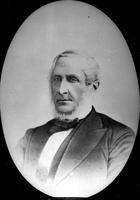
Edward Palmer, premier of PE 1859–63, politician, judge, lawyer, land agent (born 1 September 1809 in Charlottetown, PE; died 3 November 1889 in Charlottetown, PE). Edward Palmer was an outspokenly conservative member of Prince Edward Island’s “Family Compact.” He attended both the Charlottetown and Québec Conferences and emerged strongly opposed to Confederation.
Early Life
Edward Palmer was the son of James Bardin Palmer, an Irish-born attorney who came to Prince Edward Island in 1802 and became thoroughly integrated into the local elite by the time he died in 1833 — which meant that he had a stake in the dominant leasehold land system (see PEI Land Question). Several important non-resident landlords had employed him as their agent, and he left to his family a claim which resulted in ownership of approximately 12,000 acres.
After studying law in his father’s office, Edward was called to the Bar in 1830. When he entered political life on the Island, winning a Family Compact stronghold in 1834, the defining issue was the demand for escheat (i.e., the confiscation of land titles from absentee landlords for failing to fulfill the terms of their grants). Palmer was a staunch defender of the rights of property, and he quickly established himself as a leading Tory spokesman in the Assembly.
Political Career
Edward Palmer represented Charlottetown without interruption until 1870, first in the House of Assembly and then in the Legislative Council. Over the 1840s, he rose in prominence within the Conservative Party. In 1849, he became Conservative leader in the Assembly, an office he held for the next decade. Palmer was an opponent of responsible government (granted in 1851) and ensuing Liberal legislation such as the Free Education Act of 1852 and the Franchise Bill of 1853, of which the typical aim was to strengthen the position of tenant farmers — that is, most land occupiers (see PEI Land Question).
The 1850s were a challenging time in Palmer’s career. As the Tories appeared to be facing the prospect of a lengthy period in opposition, Palmer’s statement that he “had always been an advocate for the rights of proprietors” was not the type of declaration to rally ordinary Islanders. In need of a new political strategy, he successfully divided the Liberals and their base of popular support by means of the “Bible question.” Palmer, an Anglican, strongly supported the Protestant clergy’s campaign for use of the “open Bible,” with few restrictions, in publicly funded schools, which he accused the Liberal government of excluding. Protestant voters, who were in the majority, apparently accepted the Conservative arguments. In 1859, the Tories were able to form an exclusively Protestant government, which Palmer led; yet the “Bible clause” the new regime introduced essentially gave a statutory basis to the status quo.
In January 1863, Palmer led the Conservatives to a second victory after a campaign marked by additional sectarian bitterness, again resulting in an all-Protestant government. Within weeks, another Conservative, John Hamilton Gray, ousted Palmer from the premiership. Personalities appear to have been more important than policies in the intra-party struggle.
Confederation
In November 1864, the question of British North American union brought differences between John Hamilton Gray and Edward Palmer into the open. Gray was a strong supporter of Confederation, whereas Palmer was forcefully opposed to the plan. Palmer had attended both the Charlottetown and Québec Conferences, and at the Québec Conference, which is well documented, he was a dogged and intransigent source of dissent. Soon after Island delegates returned home, a series of confrontations among Conservative leaders resulted in both Gray and Palmer being left out of a reconstituted Cabinet led by James Colledge Pope, a prominent businessman whose attitude towards Confederation was ambiguous.
Confederation was at the centre of Palmer’s concerns for the remainder of his political career, and his name became synonymous with anti-confederacy in Prince Edward Island. He even switched political parties when it became evident to many that a second Conservative government led by Pope was pursuing a railway program (which the Island could not afford) and would lead the Island to Confederation. In 1872, Palmer successfully contested a Legislative Council by-election for a rural constituency and joined a Liberal and anti-Confederation government. But the die was already cast, and the Island entered Confederation on 1 July 1873.
The explanation for Palmer’s opposition to Confederation is no mystery. Although there may have been an element of personal pique, he, like most Islanders of the time, did not believe that it would benefit Prince Edward Island.
See also Prince Edward Island and Confederation.
Life after Politics
Confederation marked the end of Palmer’s career as a politician. In 1873, he was appointed judge of the newly created Queens County Court. He was named provincial chief justice in the following year and held this position until his death. The latter appointment proved controversial, as the federal government passed over two esteemed judges who were already in office. As a jurist, he was competent although undistinguished.
Legacy
Edward Palmer was at or close to the centre of public life on Prince Edward Island — either as a politician or jurist — for more than 50 years. Commencing his career primarily as a spokesman for Charlottetown and its vested interests, he eventually became parliamentary leader of the Conservative Party. After responsible government came, he slowly but successfully undertook to rebuild the party’s support, albeit in large measure by appealing to negative sectarian sentiments. After the emergence of Confederation as a central issue, he became something of a popular tribune because of his adamant opposition to union of the colonies — a position that put him in full agreement with mainstream public opinion on the Island.

 Share on Facebook
Share on Facebook Share on X
Share on X Share by Email
Share by Email Share on Google Classroom
Share on Google Classroom
